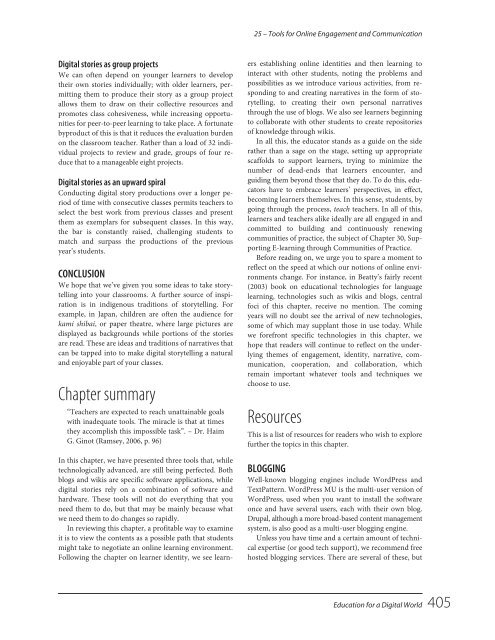Education for a Digital World Advice, Guidelines and Effective Practice from Around Globe, 2008a
Education for a Digital World Advice, Guidelines and Effective Practice from Around Globe, 2008a
Education for a Digital World Advice, Guidelines and Effective Practice from Around Globe, 2008a
You also want an ePaper? Increase the reach of your titles
YUMPU automatically turns print PDFs into web optimized ePapers that Google loves.
25 – Tools <strong>for</strong> Online Engagement <strong>and</strong> Communication<br />
<strong>Digital</strong> stories as group projects<br />
We can often depend on younger learners to develop<br />
their own stories individually; with older learners, permitting<br />
them to produce their story as a group project<br />
allows them to draw on their collective resources <strong>and</strong><br />
promotes class cohesiveness, while increasing opportunities<br />
<strong>for</strong> peer-to-peer learning to take place. A <strong>for</strong>tunate<br />
byproduct of this is that it reduces the evaluation burden<br />
on the classroom teacher. Rather than a load of 32 individual<br />
projects to review <strong>and</strong> grade, groups of four reduce<br />
that to a manageable eight projects.<br />
<strong>Digital</strong> stories as an upward spiral<br />
Conducting digital story productions over a longer period<br />
of time with consecutive classes permits teachers to<br />
select the best work <strong>from</strong> previous classes <strong>and</strong> present<br />
them as exemplars <strong>for</strong> subsequent classes. In this way,<br />
the bar is constantly raised, challenging students to<br />
match <strong>and</strong> surpass the productions of the previous<br />
year’s students.<br />
CONCLUSION<br />
We hope that we’ve given you some ideas to take storytelling<br />
into your classrooms. A further source of inspiration<br />
is in indigenous traditions of storytelling. For<br />
example, in Japan, children are often the audience <strong>for</strong><br />
kami shibai, or paper theatre, where large pictures are<br />
displayed as backgrounds while portions of the stories<br />
are read. These are ideas <strong>and</strong> traditions of narratives that<br />
can be tapped into to make digital storytelling a natural<br />
<strong>and</strong> enjoyable part of your classes.<br />
Chapter summary<br />
“Teachers are expected to reach unattainable goals<br />
with inadequate tools. The miracle is that at times<br />
they accomplish this impossible task”. – Dr. Haim<br />
G. Ginot (Ramsey, 2006, p. 96)<br />
In this chapter, we have presented three tools that, while<br />
technologically advanced, are still being perfected. Both<br />
blogs <strong>and</strong> wikis are specific software applications, while<br />
digital stories rely on a combination of software <strong>and</strong><br />
hardware. These tools will not do everything that you<br />
need them to do, but that may be mainly because what<br />
we need them to do changes so rapidly.<br />
In reviewing this chapter, a profitable way to examine<br />
it is to view the contents as a possible path that students<br />
might take to negotiate an online learning environment.<br />
Following the chapter on learner identity, we see learners<br />
establishing online identities <strong>and</strong> then learning to<br />
interact with other students, noting the problems <strong>and</strong><br />
possibilities as we introduce various activities, <strong>from</strong> responding<br />
to <strong>and</strong> creating narratives in the <strong>for</strong>m of storytelling,<br />
to creating their own personal narratives<br />
through the use of blogs. We also see learners beginning<br />
to collaborate with other students to create repositories<br />
of knowledge through wikis.<br />
In all this, the educator st<strong>and</strong>s as a guide on the side<br />
rather than a sage on the stage, setting up appropriate<br />
scaffolds to support learners, trying to minimize the<br />
number of dead-ends that learners encounter, <strong>and</strong><br />
guiding them beyond those that they do. To do this, educators<br />
have to embrace learners’ perspectives, in effect,<br />
becoming learners themselves. In this sense, students, by<br />
going through the process, teach teachers. In all of this,<br />
learners <strong>and</strong> teachers alike ideally are all engaged in <strong>and</strong><br />
committed to building <strong>and</strong> continuously renewing<br />
communities of practice, the subject of Chapter 30, Supporting<br />
E-learning through Communities of <strong>Practice</strong>.<br />
Be<strong>for</strong>e reading on, we urge you to spare a moment to<br />
reflect on the speed at which our notions of online environments<br />
change. For instance, in Beatty’s fairly recent<br />
(2003) book on educational technologies <strong>for</strong> language<br />
learning, technologies such as wikis <strong>and</strong> blogs, central<br />
foci of this chapter, receive no mention. The coming<br />
years will no doubt see the arrival of new technologies,<br />
some of which may supplant those in use today. While<br />
we <strong>for</strong>efront specific technologies in this chapter, we<br />
hope that readers will continue to reflect on the underlying<br />
themes of engagement, identity, narrative, communication,<br />
cooperation, <strong>and</strong> collaboration, which<br />
remain important whatever tools <strong>and</strong> techniques we<br />
choose to use.<br />
Resources<br />
This is a list of resources <strong>for</strong> readers who wish to explore<br />
further the topics in this chapter.<br />
BLOGGING<br />
Well-known blogging engines include WordPress <strong>and</strong><br />
TextPattern. WordPress MU is the multi-user version of<br />
WordPress, used when you want to install the software<br />
once <strong>and</strong> have several users, each with their own blog.<br />
Drupal, although a more broad-based content management<br />
system, is also good as a multi-user blogging engine.<br />
Unless you have time <strong>and</strong> a certain amount of technical<br />
expertise (or good tech support), we recommend free<br />
hosted blogging services. There are several of these, but<br />
<strong>Education</strong> <strong>for</strong> a <strong>Digital</strong> <strong>World</strong> 405


















